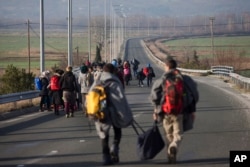The European Union is poised to further tighten border controls to deal with the unprecedented influx of migrants that is straining the resources of even the wealthier nations in the bloc.
Meeting in Brussels Thursday, the EU interior and justice ministers raised the prospect for such unilateral measures if the number of migrants arriving from Turkey has not dropped significantly by the time of an EU-Turkey summit set for next month.
Speaking to reporters as he arrived for the meeting, German Interior Minister Thomas de Maiziere said that by March 7, the EU would want to have a significant reduction in the number of refugees at the border between Turkey and Greece.
The German parliament approved tighter asylum rules Thursday, to speed up asylum procedures and the return of rejected asylum seekers. The new requirements include a two-year ban on family reunions for asylum seekers who would receive only limited refugee protection, a measure that would also affect minor children.
The German Parliamentary State Secretary of the Christian Democratic Party (CDU), Ole Schroeder, supported the stricter rules debated in the parliament, saying that the measures are necessary to sustain the capacity of the country.
"We must sustain the capacity of our country. The restriction of family reunification serves this aim," he said. "I tell the critics that the coalition didn't take it easy to come to this decision. But it is urgently needed. Our country isn't morally obliged to overburden itself and its people with humanitarian aid."
The ministerial meeting in Brussels was tense due to the dispute over Austria's decision to call a western Balkans meeting Wednesday without inviting Greece.
The Greek foreign ministry said in a statement that it was “clear that the big problems of the European Union cannot be dealt with, with thoughts, mentalities and extra-institutional initiatives that have their roots in the 19th century.”
Foreign Minister Nikos Kotzias recalled the ambassador to Austria Thursday for consultations “in order to safeguard the friendly relations between the states and the people of Greece and Austria,” the statement said.
Greece, one of the EU's most financially troubled members, has been struggling to cope with the flow of people fleeing from violence in Syria, Afghanistan and Iraq.
Greek Prime Minister Alexis Tsipras had already warned Wednesday that his country would not agree to any more deals unless other EU nations agree to share equally the burden of accommodating the nonstop flow of refugees.






